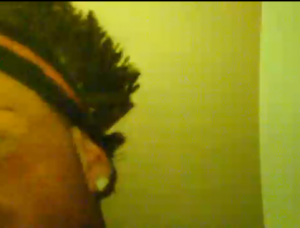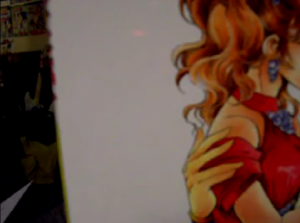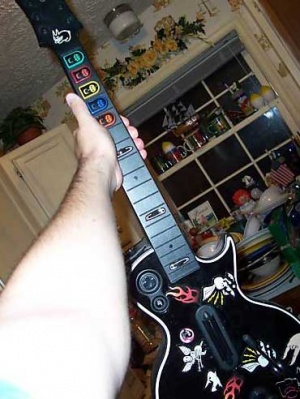Camerawork
| “ | Q: Why do so many of your videos have a greenish-yellow tinge? A: It's one of the flaws in recording with Sony's EyeCreate Program (a downloadable Playstation 3 Application that requires the Playstation Eye Camera); THEY NEED TO FIX THE PROGRAM, not only of that tint from Lack Of Some Light, but the Audio/Video skips that seems to occur during recording. |
” |
| Chris, believing it's all in the equipment | ||
Chris's approach to camerawork of all kinds is rather abysmal, whether we're talking about still photography or video work. Despite years and years of constant and obviously enthusiastic photography and home video making, Chris hasn't learned anything beyond the basics of this craft. Actually, the way he still routinely fucks up things proves that he is handling cameras far worse than your Average Joe... and as we've seen from what Chris has done to his PSEye, "bad camera handling" can be interpreted in two ways.
Chris's video production efforts have been hindered by the fact that, despite years of practice, Chris doesn't know anything about cinematography. He's oblivious to several common sense ideas like "if you want to see anything at all, light the scene properly." Something that should be remembered when considering the poor quality of the results is that Chris never even checks his videos before uploading them.
Framing the shots
Chris assumes that if he can see the lens, then everything can be seen by the lens. He has no idea what it means to be in the focus of a shot, and is constantly standing way out of center, or is putting shit way too close to the camera, so that you can't even tell what the fuck you're looking at most of the time. When handling the camerawork directly, Chris often attempts to experiment with the camera's positioning without properly considering what his audience will see, and as such we are on the receiving end of masterpieces like the Videobooks and Sonichu's Edge. Additionally, his lack of proper equipment or controlled co-ordination tends to weigh down such endeavors with constant shaking, or disorienting angles.
Focus
Chris relies extensively on autofocus. Autofocus usually works with a slight delay and it usually can't focus on subjects that are too close to the camera. Many cameras have specific autofocus mode or require manual focus for macro photography.
Chris's attempts at using manual focus, as evidenced in A Week With Christian Chandler (probably shot with a 35mm SLR camera from the school), have resulted in some rather blurry shots.
Lighting
Most of Chris's YouTube videos have been lit completely wrong. Plainly put: If you're making videos indoors, you've got to turn the room lights on; human brains can automatically adjust to different color temperatures, but film and video cameras either lack the automatics to handle this, or are constantly struggling in bad lighting conditions to figure out what's going on. Chris assumes that if there's enough natural light coming in for him to see anything at all, then the video is lit properly. As a result, many of Chris's indoor video shots have a distinct yellow tint. Of course, it also doesn't help that he has never heard of White Balance.
Many of Chris's photographs, as in the Scrapbook and A Week With Christian Chandler, have been shot against light (i.e., camera facing the light source). This usually leaves the subjects in shadow and obscures the details.
Chris also commits a common novice mistake in thinking that camera flash completely negates the need for proper lighting (a naïve view of "if it's day, everything is OK, but if it's night, then just use the flash"). In fact, flash will highlight the front of the scene, but it can also over-expose the shot if the subject is too close to the camera. If the background is unlit, it adds a very big contrast and stark shadows.
Post-Production
As inept as he is at video production, he's equally bad at post-production as well. A good example of this is whenever he needs to put text on the screen during his videos. Even the simplest video editing software allows people to easily put text on the screen and make it so that anyone watching the video can read it, whether it's changing the color of the font or adding a drop shadow. Chris doesn't do this, opting instead to write the text on a piece of paper and film it with his camera. Probably the best example of this is seen in the infamous July 10th messages in which, at the start of each of the videos, he films a piece of paper with a YouTube username while informing us that the video we're about to see is addressed to the user whose name is written. In one of the videos, he has a message below the username that, because he never bothers to focus the camera, is completely unreadable. This wouldn't be a problem if he could just use software to add text to the video.
He did once use video editing software to add text and effects, in his entry in the PaRappa The Rapper contest that the no-good Adam Stackhouse ended up winning. The result is the video makes even less sense than it did without the use of editing software. The effects added to the video are all stock effects, most of which make no sense in the context of the video. For example, in one part, Chris has a graphic that reads "Birthday Boy" on the screen, even though the video had nothing to do with his birthday. One can argue, though, that this was his attempt at random access humor and that it's not supposed to make sense.
This is not to say he can't edit, because there are a couple of music videos that show that he can, indeeed, put shots together in a way that the video conveys a message that it's supposed to. This is present in his music videos for Holdin' Out For a Hero and Boyfriend. Of course, they both suck, but the fact that he can at least put shots together proves that, if he could just learn how to use editing software for more than just putting shots together, he could be a filmmaker. Then again, he never learns.
When the video is uploaded to YouTube, most of the time Chris doesn't bother to name it. And when he does, he leaves the .MOV extension in the video title, suggesting that his videos are uploaded in the Quick Time format. Obviously, he wouldn't bother using any of his monthly tugboat purchasing a Mac when there are better things to spend your tax dollars on. Whether the computer in the kitchen has software that exports to Quick Time or his camera uses SD cards or other flash memory in a way that he can simply upload the video from the memory is a mystery.
In Some Favored Comedians, Chris, in an attempt to insert clips for comparison, records TV screen. Most people would think that actually editing the clips in might be a far more sensible strategy, as these shows are potentially available in digital format. Recording things off TV screen without extra preparation often results in a completely unwatchable picture, and this is no exception.




